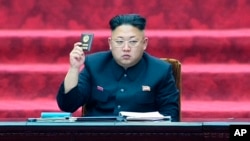This week North Korea is convening its first major parliamentary meeting of the year. It is a scripted event that is widely seen as a façade to give the authoritarian rule of Kim Jong Un the appearance of democratic support. These sessions might offer some insight into the leadership’s grasp on power and the stability of the regime.
The third session of the 13th Supreme People's Assembly of the Democratic People’s Republic of Korea will bring together 687 representatives from the country. These legislative sessions are highly orchestrated. The delegates all vote in favor of all motions without debate.
The elaborate presentation is designed to showcase the power and prestige of Kim Jong Un, the third generation supreme leader of the country.
Little is actually known about how real power is exercised and decisions are made inside this secretive, totalitarian regime.
But analysts and foreign intelligence agencies study these public sessions to assess who may be gaining influence and how they might affect economic and security policies.
Inability to persue reforms
Ahn Chan-il, a North Korean defector and head of the World Institute for North Korea Studies, says Kim Jong Un’s recent appointments were older military and party leaders tied to his father’s pro-nuclear development policies. He says these moves indicate Kim is unable to pursue reforms he may have initially wanted.
He says in major construction, development of nuclear weapons, enhancement of asymmetric power and organization of strategic military, Kim Jong Un’s regime may have been trying to get away from the military-first policy. But he cannot get out of it and is still hovering in the same spot.
Jang Jin-seong, also a North Korean defector and professor at Leiden University in the Netherlands, believes Kim Jong Un is trapped in the power structure created by his father.
He says the difference between Kim Jong Il and Kim Jong Un is that Kim Jong Il is a dictator of his own making by his own hands, while Kim Jong Un is a hereditary successor. This is a big difference.
While Kim Jong Il also succeeded his father as North Korea’s leader, he spent decades as the heir apparent to the position. During that time he consolidated power, sidelined potential rivals and held a number of official posts. Kim Jong Un spent less than two years as the heir apparent to his father and therefore has had to solidify his control while in office.
Cult of personality
Staged events like the People’s Assembly are part of the extensive propaganda efforts aimed at nurturing the cult of personality around the Kim family, portraying the leader as an infallible godlike figure. Jang Jin Seong he says this third generation leader is not seen as all-powerful by a growing number of people.
Determining what the public or top officials really think about an issue is virtually impossible in the totalitarian country.
Andrei Lankov, a professor of North Korea history at Kookmin University in Seoul, cautions that speculation on how decisions are made in this closed system, is often unreliable.
“One of the most guarded secrets is the inner circle and the sort of [lets’] say royal family of the country. We know very little. And those who do know something are not going to talk to you because when they start talking, they will be in trouble,” said Lankov.
Very few outsiders are allowed to visit North Korea and there are virtually no opportunities for foreigners to informally discuss political topics with North Korean officials.
While the People’s Assembly may offer a rare but controlled glimpse into the tone and direction of the Kim Jong Un government, Lankov says one should not read too much into it.
VOA Seoul Producer Youmi Kim contributed to this report.














